Leadership Management: GROW Model, Emotional Intelligence, and OHS
VerifiedAdded on 2023/06/03
|9
|1814
|291
Report
AI Summary
This assignment provides a detailed exploration of the GROW Model and emotional intelligence in the context of leadership and management. It addresses various scenarios, including responding to a Store Manager's negative behavior, applying emotional intelligence principles, and understanding the impact of behavior on store morale. The assignment also discusses potential misinterpretations in a diverse workforce, strategies for raising cultural awareness, and the importance of empathy and self-awareness in leadership. Furthermore, it examines the relationship between emotionally effective people and business objectives, the role of emotional impact in decision-making, and relevant policies and legislation, including OHS/WHS, that govern managing emotions in the workplace. The document concludes by emphasizing the legal responsibilities of employers in maintaining a mentally healthy and safe work environment.

Leadership
Paraphrase This Document
Need a fresh take? Get an instant paraphrase of this document with our AI Paraphraser
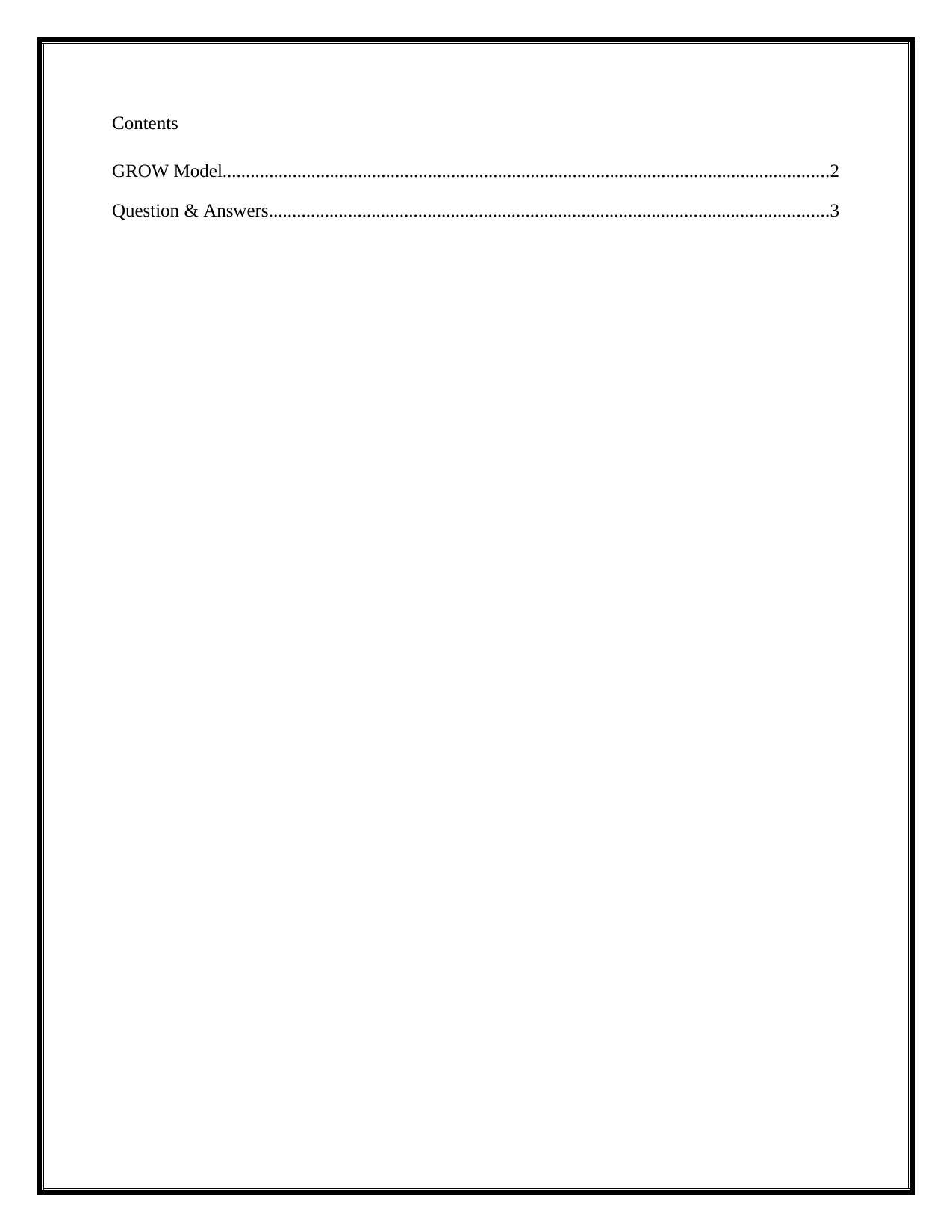
Contents
GROW Model..................................................................................................................................2
Question & Answers........................................................................................................................3
GROW Model..................................................................................................................................2
Question & Answers........................................................................................................................3
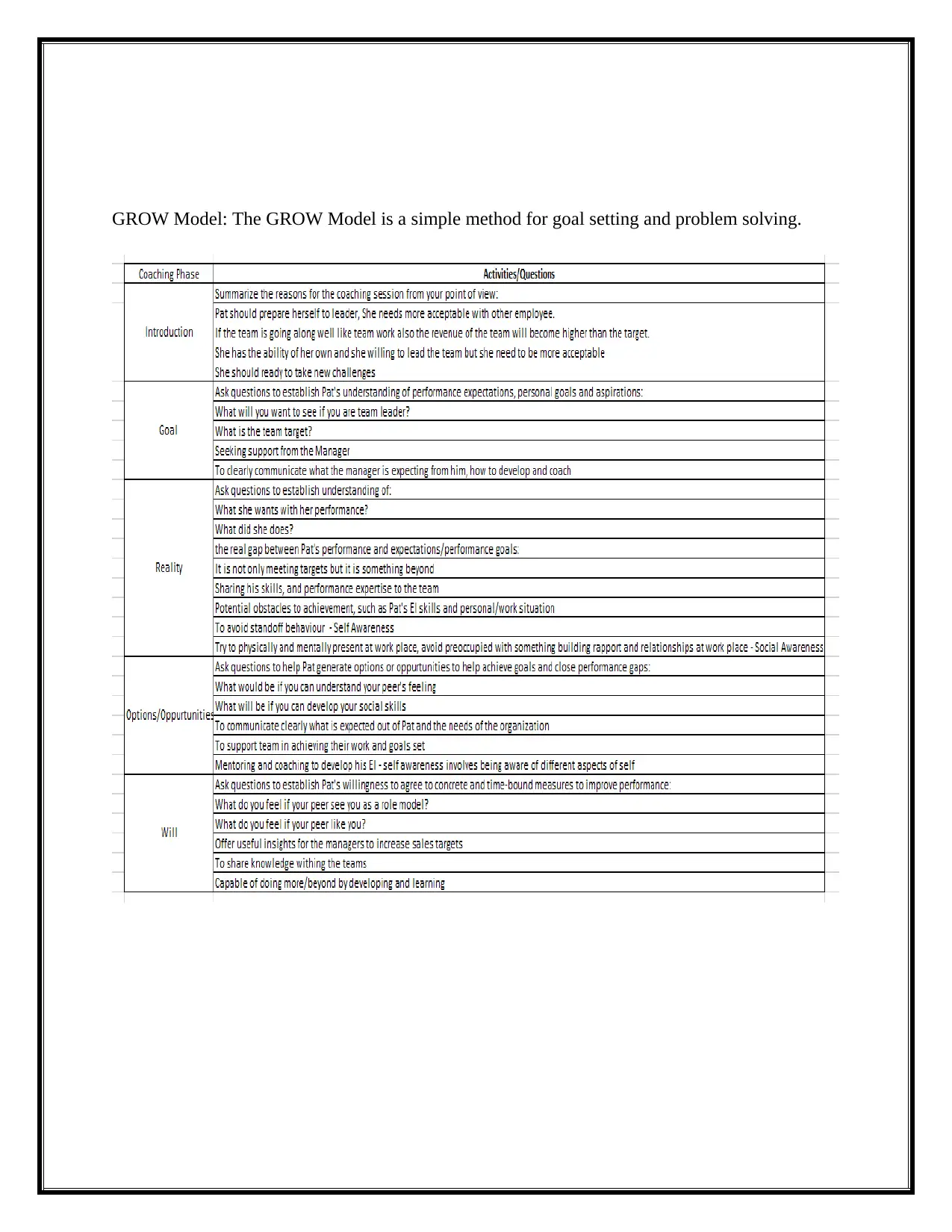
GROW Model: The GROW Model is a simple method for goal setting and problem solving.
⊘ This is a preview!⊘
Do you want full access?
Subscribe today to unlock all pages.

Trusted by 1+ million students worldwide
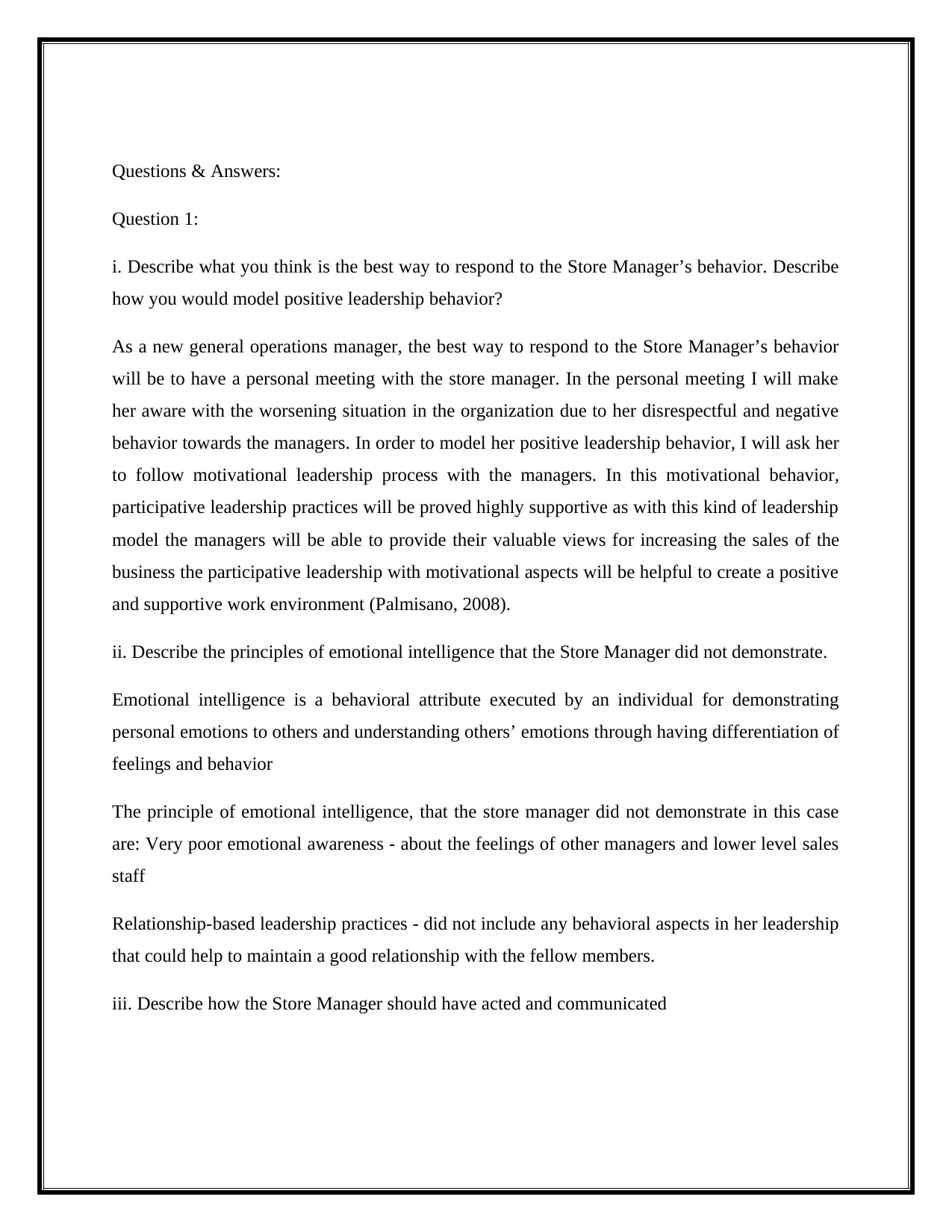
Questions & Answers:
Question 1:
i. Describe what you think is the best way to respond to the Store Manager’s behavior. Describe
how you would model positive leadership behavior?
As a new general operations manager, the best way to respond to the Store Manager’s behavior
will be to have a personal meeting with the store manager. In the personal meeting I will make
her aware with the worsening situation in the organization due to her disrespectful and negative
behavior towards the managers. In order to model her positive leadership behavior, I will ask her
to follow motivational leadership process with the managers. In this motivational behavior,
participative leadership practices will be proved highly supportive as with this kind of leadership
model the managers will be able to provide their valuable views for increasing the sales of the
business the participative leadership with motivational aspects will be helpful to create a positive
and supportive work environment (Palmisano, 2008).
ii. Describe the principles of emotional intelligence that the Store Manager did not demonstrate.
Emotional intelligence is a behavioral attribute executed by an individual for demonstrating
personal emotions to others and understanding others’ emotions through having differentiation of
feelings and behavior
The principle of emotional intelligence, that the store manager did not demonstrate in this case
are: Very poor emotional awareness - about the feelings of other managers and lower level sales
staff
Relationship-based leadership practices - did not include any behavioral aspects in her leadership
that could help to maintain a good relationship with the fellow members.
iii. Describe how the Store Manager should have acted and communicated
Question 1:
i. Describe what you think is the best way to respond to the Store Manager’s behavior. Describe
how you would model positive leadership behavior?
As a new general operations manager, the best way to respond to the Store Manager’s behavior
will be to have a personal meeting with the store manager. In the personal meeting I will make
her aware with the worsening situation in the organization due to her disrespectful and negative
behavior towards the managers. In order to model her positive leadership behavior, I will ask her
to follow motivational leadership process with the managers. In this motivational behavior,
participative leadership practices will be proved highly supportive as with this kind of leadership
model the managers will be able to provide their valuable views for increasing the sales of the
business the participative leadership with motivational aspects will be helpful to create a positive
and supportive work environment (Palmisano, 2008).
ii. Describe the principles of emotional intelligence that the Store Manager did not demonstrate.
Emotional intelligence is a behavioral attribute executed by an individual for demonstrating
personal emotions to others and understanding others’ emotions through having differentiation of
feelings and behavior
The principle of emotional intelligence, that the store manager did not demonstrate in this case
are: Very poor emotional awareness - about the feelings of other managers and lower level sales
staff
Relationship-based leadership practices - did not include any behavioral aspects in her leadership
that could help to maintain a good relationship with the fellow members.
iii. Describe how the Store Manager should have acted and communicated
Paraphrase This Document
Need a fresh take? Get an instant paraphrase of this document with our AI Paraphraser
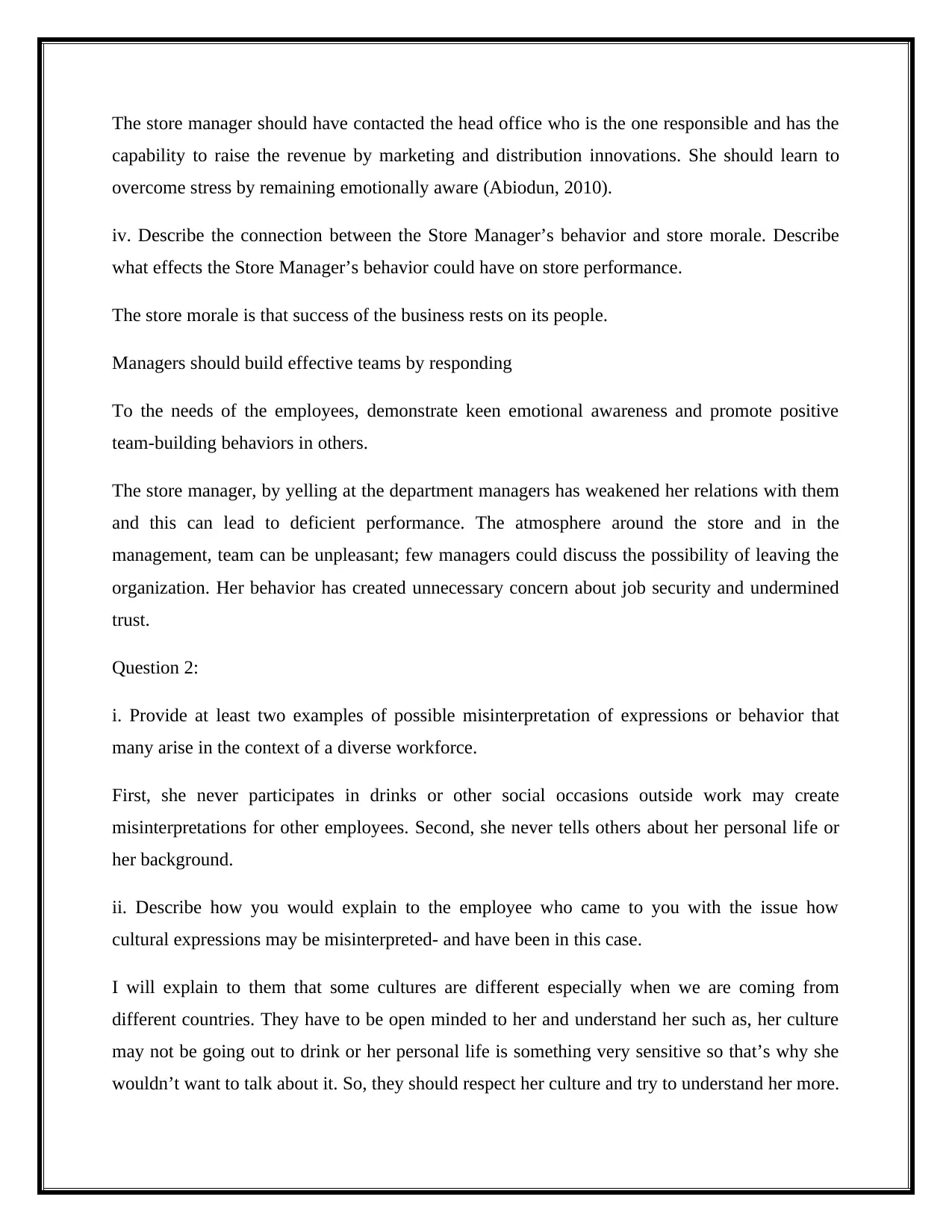
The store manager should have contacted the head office who is the one responsible and has the
capability to raise the revenue by marketing and distribution innovations. She should learn to
overcome stress by remaining emotionally aware (Abiodun, 2010).
iv. Describe the connection between the Store Manager’s behavior and store morale. Describe
what effects the Store Manager’s behavior could have on store performance.
The store morale is that success of the business rests on its people.
Managers should build effective teams by responding
To the needs of the employees, demonstrate keen emotional awareness and promote positive
team-building behaviors in others.
The store manager, by yelling at the department managers has weakened her relations with them
and this can lead to deficient performance. The atmosphere around the store and in the
management, team can be unpleasant; few managers could discuss the possibility of leaving the
organization. Her behavior has created unnecessary concern about job security and undermined
trust.
Question 2:
i. Provide at least two examples of possible misinterpretation of expressions or behavior that
many arise in the context of a diverse workforce.
First, she never participates in drinks or other social occasions outside work may create
misinterpretations for other employees. Second, she never tells others about her personal life or
her background.
ii. Describe how you would explain to the employee who came to you with the issue how
cultural expressions may be misinterpreted- and have been in this case.
I will explain to them that some cultures are different especially when we are coming from
different countries. They have to be open minded to her and understand her such as, her culture
may not be going out to drink or her personal life is something very sensitive so that’s why she
wouldn’t want to talk about it. So, they should respect her culture and try to understand her more.
capability to raise the revenue by marketing and distribution innovations. She should learn to
overcome stress by remaining emotionally aware (Abiodun, 2010).
iv. Describe the connection between the Store Manager’s behavior and store morale. Describe
what effects the Store Manager’s behavior could have on store performance.
The store morale is that success of the business rests on its people.
Managers should build effective teams by responding
To the needs of the employees, demonstrate keen emotional awareness and promote positive
team-building behaviors in others.
The store manager, by yelling at the department managers has weakened her relations with them
and this can lead to deficient performance. The atmosphere around the store and in the
management, team can be unpleasant; few managers could discuss the possibility of leaving the
organization. Her behavior has created unnecessary concern about job security and undermined
trust.
Question 2:
i. Provide at least two examples of possible misinterpretation of expressions or behavior that
many arise in the context of a diverse workforce.
First, she never participates in drinks or other social occasions outside work may create
misinterpretations for other employees. Second, she never tells others about her personal life or
her background.
ii. Describe how you would explain to the employee who came to you with the issue how
cultural expressions may be misinterpreted- and have been in this case.
I will explain to them that some cultures are different especially when we are coming from
different countries. They have to be open minded to her and understand her such as, her culture
may not be going out to drink or her personal life is something very sensitive so that’s why she
wouldn’t want to talk about it. So, they should respect her culture and try to understand her more.
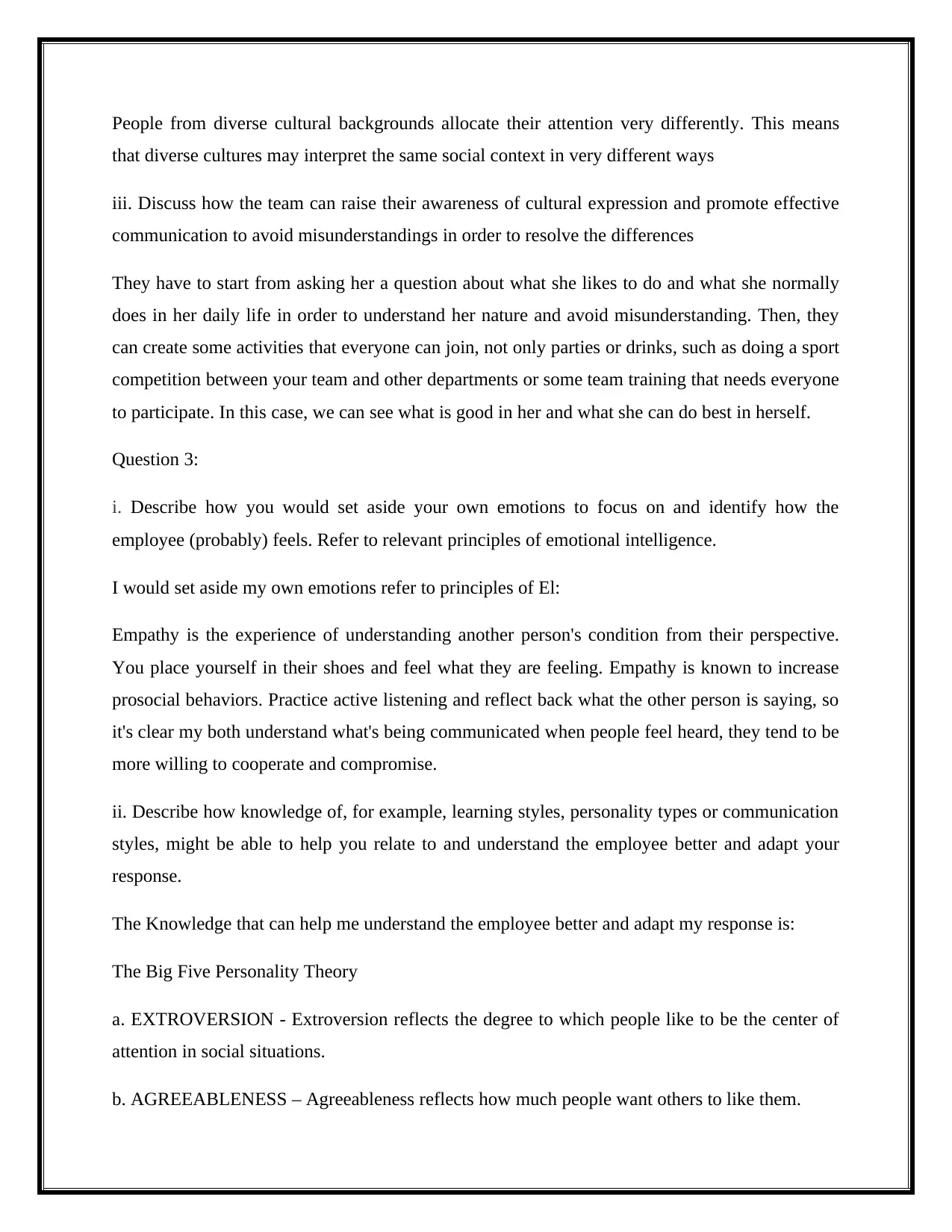
People from diverse cultural backgrounds allocate their attention very differently. This means
that diverse cultures may interpret the same social context in very different ways
iii. Discuss how the team can raise their awareness of cultural expression and promote effective
communication to avoid misunderstandings in order to resolve the differences
They have to start from asking her a question about what she likes to do and what she normally
does in her daily life in order to understand her nature and avoid misunderstanding. Then, they
can create some activities that everyone can join, not only parties or drinks, such as doing a sport
competition between your team and other departments or some team training that needs everyone
to participate. In this case, we can see what is good in her and what she can do best in herself.
Question 3:
i. Describe how you would set aside your own emotions to focus on and identify how the
employee (probably) feels. Refer to relevant principles of emotional intelligence.
I would set aside my own emotions refer to principles of El:
Empathy is the experience of understanding another person's condition from their perspective.
You place yourself in their shoes and feel what they are feeling. Empathy is known to increase
prosocial behaviors. Practice active listening and reflect back what the other person is saying, so
it's clear my both understand what's being communicated when people feel heard, they tend to be
more willing to cooperate and compromise.
ii. Describe how knowledge of, for example, learning styles, personality types or communication
styles, might be able to help you relate to and understand the employee better and adapt your
response.
The Knowledge that can help me understand the employee better and adapt my response is:
The Big Five Personality Theory
a. EXTROVERSION - Extroversion reflects the degree to which people like to be the center of
attention in social situations.
b. AGREEABLENESS – Agreeableness reflects how much people want others to like them.
that diverse cultures may interpret the same social context in very different ways
iii. Discuss how the team can raise their awareness of cultural expression and promote effective
communication to avoid misunderstandings in order to resolve the differences
They have to start from asking her a question about what she likes to do and what she normally
does in her daily life in order to understand her nature and avoid misunderstanding. Then, they
can create some activities that everyone can join, not only parties or drinks, such as doing a sport
competition between your team and other departments or some team training that needs everyone
to participate. In this case, we can see what is good in her and what she can do best in herself.
Question 3:
i. Describe how you would set aside your own emotions to focus on and identify how the
employee (probably) feels. Refer to relevant principles of emotional intelligence.
I would set aside my own emotions refer to principles of El:
Empathy is the experience of understanding another person's condition from their perspective.
You place yourself in their shoes and feel what they are feeling. Empathy is known to increase
prosocial behaviors. Practice active listening and reflect back what the other person is saying, so
it's clear my both understand what's being communicated when people feel heard, they tend to be
more willing to cooperate and compromise.
ii. Describe how knowledge of, for example, learning styles, personality types or communication
styles, might be able to help you relate to and understand the employee better and adapt your
response.
The Knowledge that can help me understand the employee better and adapt my response is:
The Big Five Personality Theory
a. EXTROVERSION - Extroversion reflects the degree to which people like to be the center of
attention in social situations.
b. AGREEABLENESS – Agreeableness reflects how much people want others to like them.
⊘ This is a preview!⊘
Do you want full access?
Subscribe today to unlock all pages.

Trusted by 1+ million students worldwide
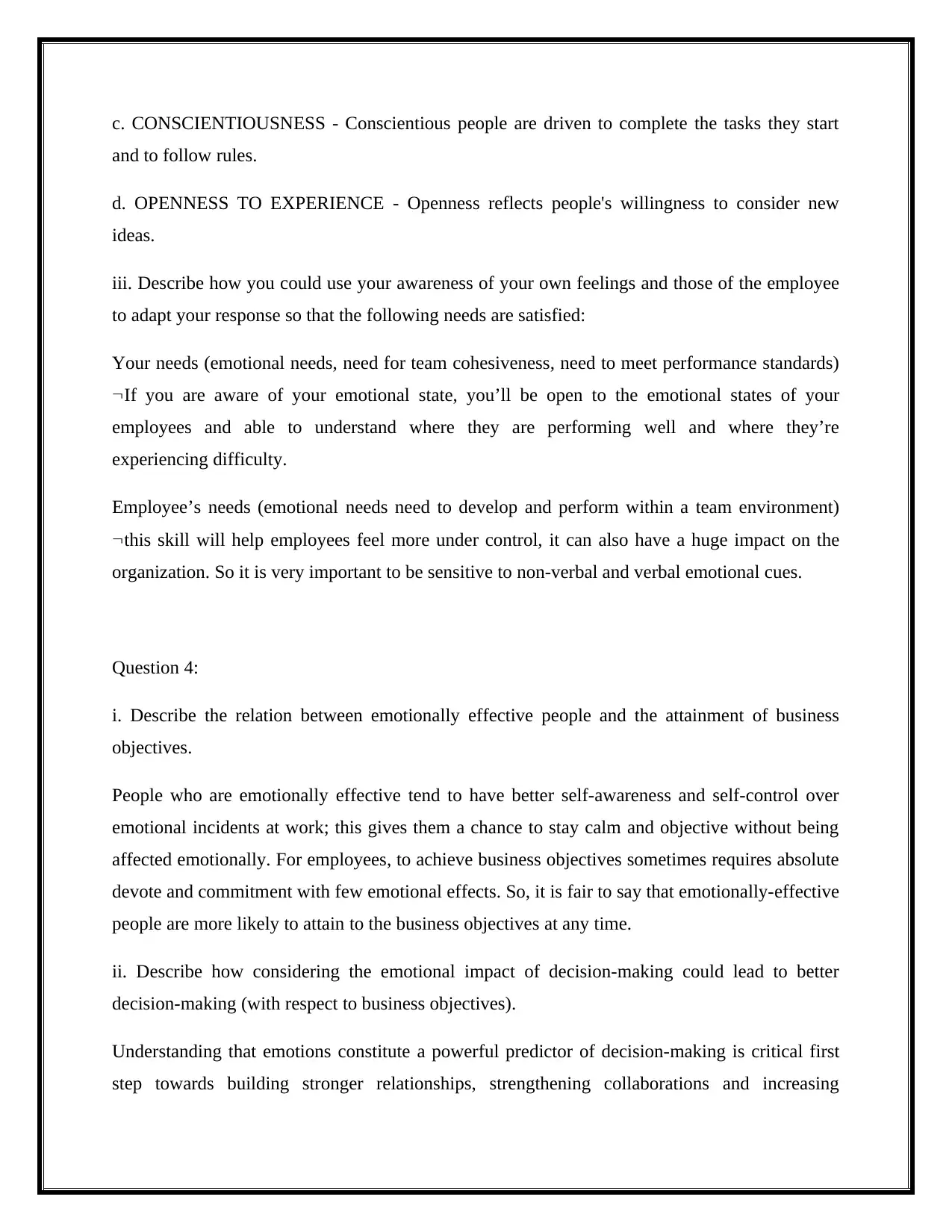
c. CONSCIENTIOUSNESS - Conscientious people are driven to complete the tasks they start
and to follow rules.
d. OPENNESS TO EXPERIENCE - Openness reflects people's willingness to consider new
ideas.
iii. Describe how you could use your awareness of your own feelings and those of the employee
to adapt your response so that the following needs are satisfied:
Your needs (emotional needs, need for team cohesiveness, need to meet performance standards)
If you are aware of your emotional state, you’ll be open to the emotional states of your
employees and able to understand where they are performing well and where they’re
experiencing difficulty.
Employee’s needs (emotional needs need to develop and perform within a team environment)
this skill will help employees feel more under control, it can also have a huge impact on the
organization. So it is very important to be sensitive to non-verbal and verbal emotional cues.
Question 4:
i. Describe the relation between emotionally effective people and the attainment of business
objectives.
People who are emotionally effective tend to have better self-awareness and self-control over
emotional incidents at work; this gives them a chance to stay calm and objective without being
affected emotionally. For employees, to achieve business objectives sometimes requires absolute
devote and commitment with few emotional effects. So, it is fair to say that emotionally-effective
people are more likely to attain to the business objectives at any time.
ii. Describe how considering the emotional impact of decision-making could lead to better
decision-making (with respect to business objectives).
Understanding that emotions constitute a powerful predictor of decision-making is critical first
step towards building stronger relationships, strengthening collaborations and increasing
and to follow rules.
d. OPENNESS TO EXPERIENCE - Openness reflects people's willingness to consider new
ideas.
iii. Describe how you could use your awareness of your own feelings and those of the employee
to adapt your response so that the following needs are satisfied:
Your needs (emotional needs, need for team cohesiveness, need to meet performance standards)
If you are aware of your emotional state, you’ll be open to the emotional states of your
employees and able to understand where they are performing well and where they’re
experiencing difficulty.
Employee’s needs (emotional needs need to develop and perform within a team environment)
this skill will help employees feel more under control, it can also have a huge impact on the
organization. So it is very important to be sensitive to non-verbal and verbal emotional cues.
Question 4:
i. Describe the relation between emotionally effective people and the attainment of business
objectives.
People who are emotionally effective tend to have better self-awareness and self-control over
emotional incidents at work; this gives them a chance to stay calm and objective without being
affected emotionally. For employees, to achieve business objectives sometimes requires absolute
devote and commitment with few emotional effects. So, it is fair to say that emotionally-effective
people are more likely to attain to the business objectives at any time.
ii. Describe how considering the emotional impact of decision-making could lead to better
decision-making (with respect to business objectives).
Understanding that emotions constitute a powerful predictor of decision-making is critical first
step towards building stronger relationships, strengthening collaborations and increasing
Paraphrase This Document
Need a fresh take? Get an instant paraphrase of this document with our AI Paraphraser
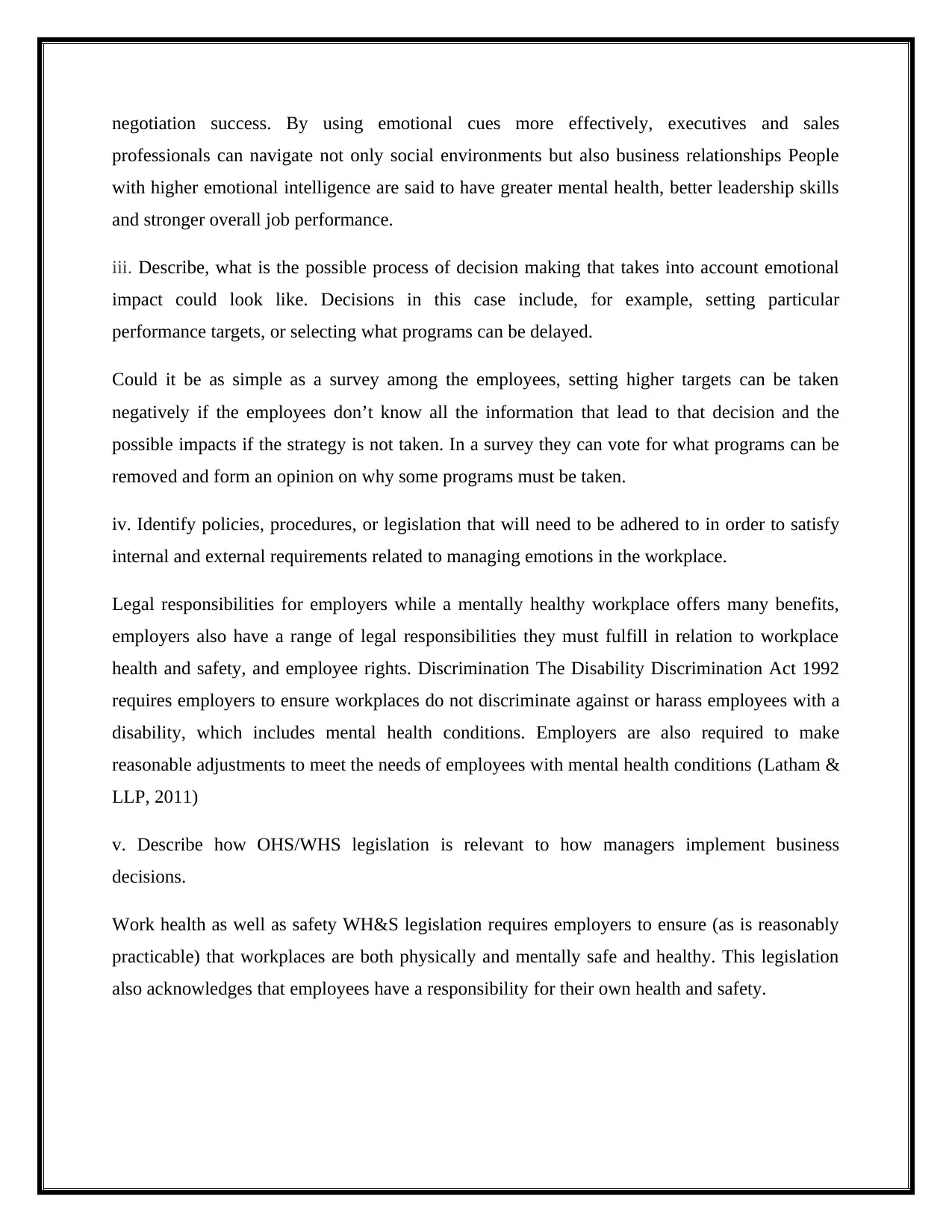
negotiation success. By using emotional cues more effectively, executives and sales
professionals can navigate not only social environments but also business relationships People
with higher emotional intelligence are said to have greater mental health, better leadership skills
and stronger overall job performance.
iii. Describe, what is the possible process of decision making that takes into account emotional
impact could look like. Decisions in this case include, for example, setting particular
performance targets, or selecting what programs can be delayed.
Could it be as simple as a survey among the employees, setting higher targets can be taken
negatively if the employees don’t know all the information that lead to that decision and the
possible impacts if the strategy is not taken. In a survey they can vote for what programs can be
removed and form an opinion on why some programs must be taken.
iv. Identify policies, procedures, or legislation that will need to be adhered to in order to satisfy
internal and external requirements related to managing emotions in the workplace.
Legal responsibilities for employers while a mentally healthy workplace offers many benefits,
employers also have a range of legal responsibilities they must fulfill in relation to workplace
health and safety, and employee rights. Discrimination The Disability Discrimination Act 1992
requires employers to ensure workplaces do not discriminate against or harass employees with a
disability, which includes mental health conditions. Employers are also required to make
reasonable adjustments to meet the needs of employees with mental health conditions (Latham &
LLP, 2011)
v. Describe how OHS/WHS legislation is relevant to how managers implement business
decisions.
Work health as well as safety WH&S legislation requires employers to ensure (as is reasonably
practicable) that workplaces are both physically and mentally safe and healthy. This legislation
also acknowledges that employees have a responsibility for their own health and safety.
professionals can navigate not only social environments but also business relationships People
with higher emotional intelligence are said to have greater mental health, better leadership skills
and stronger overall job performance.
iii. Describe, what is the possible process of decision making that takes into account emotional
impact could look like. Decisions in this case include, for example, setting particular
performance targets, or selecting what programs can be delayed.
Could it be as simple as a survey among the employees, setting higher targets can be taken
negatively if the employees don’t know all the information that lead to that decision and the
possible impacts if the strategy is not taken. In a survey they can vote for what programs can be
removed and form an opinion on why some programs must be taken.
iv. Identify policies, procedures, or legislation that will need to be adhered to in order to satisfy
internal and external requirements related to managing emotions in the workplace.
Legal responsibilities for employers while a mentally healthy workplace offers many benefits,
employers also have a range of legal responsibilities they must fulfill in relation to workplace
health and safety, and employee rights. Discrimination The Disability Discrimination Act 1992
requires employers to ensure workplaces do not discriminate against or harass employees with a
disability, which includes mental health conditions. Employers are also required to make
reasonable adjustments to meet the needs of employees with mental health conditions (Latham &
LLP, 2011)
v. Describe how OHS/WHS legislation is relevant to how managers implement business
decisions.
Work health as well as safety WH&S legislation requires employers to ensure (as is reasonably
practicable) that workplaces are both physically and mentally safe and healthy. This legislation
also acknowledges that employees have a responsibility for their own health and safety.
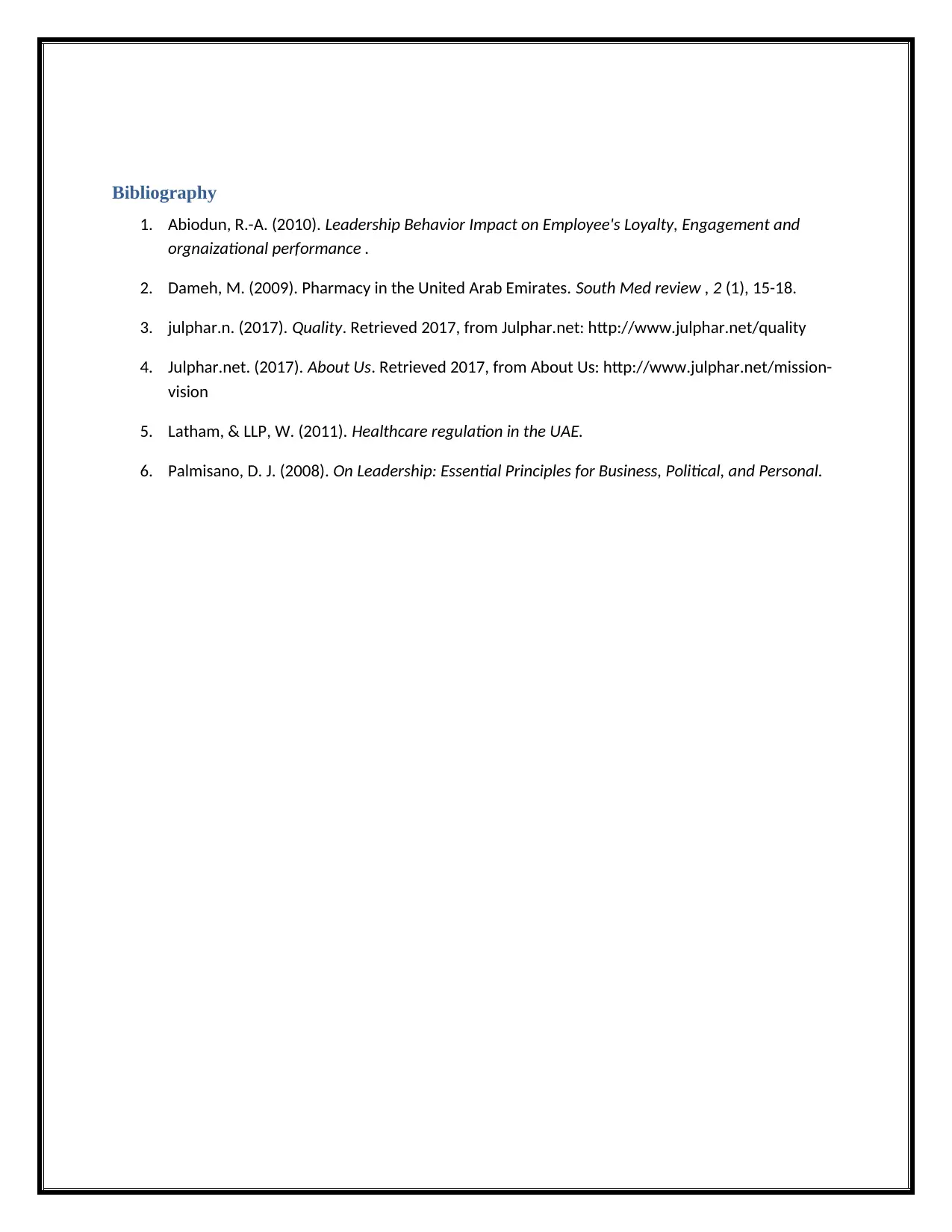
Bibliography
1. Abiodun, R.-A. (2010). Leadership Behavior Impact on Employee's Loyalty, Engagement and
orgnaizational performance .
2. Dameh, M. (2009). Pharmacy in the United Arab Emirates. South Med review , 2 (1), 15-18.
3. julphar.n. (2017). Quality. Retrieved 2017, from Julphar.net: http://www.julphar.net/quality
4. Julphar.net. (2017). About Us. Retrieved 2017, from About Us: http://www.julphar.net/mission-
vision
5. Latham, & LLP, W. (2011). Healthcare regulation in the UAE.
6. Palmisano, D. J. (2008). On Leadership: Essential Principles for Business, Political, and Personal.
1. Abiodun, R.-A. (2010). Leadership Behavior Impact on Employee's Loyalty, Engagement and
orgnaizational performance .
2. Dameh, M. (2009). Pharmacy in the United Arab Emirates. South Med review , 2 (1), 15-18.
3. julphar.n. (2017). Quality. Retrieved 2017, from Julphar.net: http://www.julphar.net/quality
4. Julphar.net. (2017). About Us. Retrieved 2017, from About Us: http://www.julphar.net/mission-
vision
5. Latham, & LLP, W. (2011). Healthcare regulation in the UAE.
6. Palmisano, D. J. (2008). On Leadership: Essential Principles for Business, Political, and Personal.
⊘ This is a preview!⊘
Do you want full access?
Subscribe today to unlock all pages.

Trusted by 1+ million students worldwide
1 out of 9
Related Documents
Your All-in-One AI-Powered Toolkit for Academic Success.
+13062052269
info@desklib.com
Available 24*7 on WhatsApp / Email
![[object Object]](/_next/static/media/star-bottom.7253800d.svg)
Unlock your academic potential
Copyright © 2020–2026 A2Z Services. All Rights Reserved. Developed and managed by ZUCOL.




